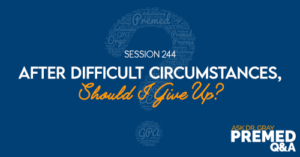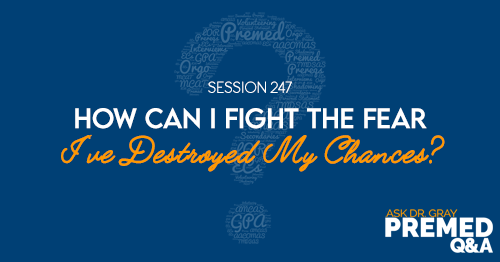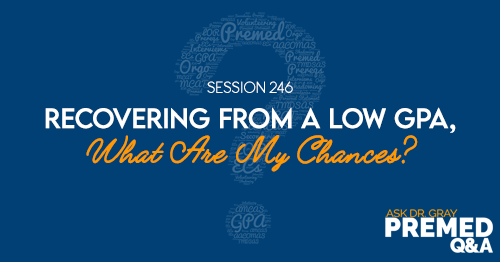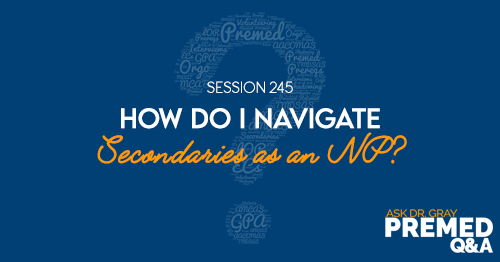Apple Podcasts | Google Podcasts
Session 244
This student is seeking advice on her medical school application process after facing several personal challenges, including the death of her husband, being diagnosed with autism, and having a young child. What is the best path forward in overcoming these obstacles to achieve her dream of becoming a physician?
Ask Dr. Gray: Premed Q&A is brought to you by Blueprint MCAT. Listen to this podcast episode with the player above, or keep reading for the highlights and takeaway points.
The episodes in this podcast are recordings of our Facebook Live that we do at 3 pm Eastern on most weekdays. Check out our Facebook page and like the page to be notified. Also, listen to our other podcasts on MedEd Media. If you have any questions, call me at 617-410-6747.
Question of the Day:
“I applied and successfully completed an MPH program in 2019. However, before pursuing further in that field, I decided to take some time to pursue my dream of becoming a professional performing artist and coach. In the meantime, I also got married and my team was doing well. We then decided to try for our first child. Unfortunately, COVID-19 disrupted my plans, and I had to navigate being pregnant during the pandemic. Despite these challenges, my goal of returning to school was always in the back of my mind.
In 2021, I received a late diagnosis of Autism Spectrum Disorder (ASD), which added another layer to my journey. I decided to focus on studying for the MCAT while being present for my child during their early years. During this time, I also volunteered as a crisis hotline responder and engaged in virtual shadowing opportunities. I invested a lot of effort into preparing for medical school applications, including purchasing books, watching videos, and even doing a mock interview.
Tragically, my husband died by suicide in September 2022, which was a tremendous shock for everyone. Just two days later, I received an interview invitation from the University of Arizona, Tucson. Despite the circumstances, I decided to go ahead with the interview, as pursuing medicine had been my lifelong dream. Although I felt I performed well during the interview, I ultimately did not receive an acceptance.
Now at 33 years old, with a three-year-old daughter, I am left wondering about the next steps in my journey. Medicine has always been a passion of mine since my early twenties, stemming from personal experiences with surgery as a newborn and my involvement in caring for sick family members. The first rejection hit me hard, but I learned from my mistakes and gave my all in subsequent applications, only to face disappointment once again.
So, the overarching question remains: Where do I go from here? I have many questions and uncertainties, but the burning desire to pursue medicine still persists.”
Addressing Weaknesses and Seeking Opportunities
Your application should indicate aspects that schools appreciate, but there might be issues with your interview that didn’t align or meet the criteria this year.
Reflecting on your application, what do you think is the reason it’s not getting attention from other schools? Do you believe Arizona is either overlooking or giving you the benefit of the doubt due to being an in-state applicant? Identify the weakest part of your application that you think needs improvement.
And so, this student identifies several areas of concern in herapplication. She believes that the combination of gaps in her experiences and her MCAT score has impacted her competitiveness.
Struggling with the Numbers
She mentions struggling with standardized tests, particularly ther initial MCAT score of five when she was among the first group to take the new MCAT. In subsequent attempts in 2021 and 2022, she achieved a score of 503, which she acknowledges is not exceptional. Additionally, her undergrad cumulative GPA was 3.39, but improved to almost a 4.0 during her MPH program, with a strong performance in science courses boosting their cumulative science GPA slightly.
Concerns about Scribe and Clinical Experiences
Throughout her journey, she worked as a scribe for both an orthopedic surgeon and podiatrist for a consistent period of five years. This role provided her with valuable opportunities to shadow surgeries and engage in various clinical activities. Additionally, she embarked on a medical mission trip to El Salvador alongside one of the surgeons she scribed for, which greatly impacted her. In addition to her scribing work, she dedicated time to volunteer at hospitals. Following her completion of the MCAT, she engaged in crisis volunteering through a text crisis call line, but unfortunately had to discontinue after the tragic passing of her husband.
The Age of Experience
One of the potential red flags in her application is the age of her scribe experiences, which may raise questions for admissions committees. Furthermore, her most recent clinical experience lacks direct interaction with patients in a clinical setting. The COVID-19 pandemic has shed light on the value of crisis text hotlines and virtual care, prompting a shift to consider them as clinical experiences.
The Depth of Experience
However, there could still be an issue with the depth of her clinical exposure. Without reviewing her application and understanding her narrative and motivations, there is concern that her limited clinical experiences, especially recent ones, might appear as mere checkboxes rather than a genuine desire to pursue medicine.
“If you don’t have a lot of recent experiences where you’re directly interacting with these patients, how good of a story are you telling to the person reading your application?”
Additionally, her interactions with patients are outdated or disconnected from direct human contact. This may hinder herability to effectively convey her story and passion for medicine in both her writing and interviews. This disconnect could be the primary challenge in her application, alongside relatively weaker statistics and the question of why she received one interview invitation.
The Importance of Deeper Connections to Medicine
When reviewing applications, superficial connections to medicine, such as enjoying relationships and listening to people’s stories, are often seen as weak reflections of a genuine desire to become a physician. While building relationships is valuable in various aspects of life, it is not a specific reason to pursue a medical career.
Applicants must delve deeper and uncover the core motivations driving their passion for medicine. The focus should be on understanding what truly inspires them to become a physician, rather than merely seeking relationships and hearing stories.
Medical schools seek candidates who have a profound connection to the field and are driven by a genuine desire to make a difference in the lives of patients, not solely to enjoy personal connections.
Insights on End-of-Life Care and Death Doula Certificates
After experiencing the loss of her husband, this female student gained profound insights into the complexities surrounding end-of-life care. Being thrust into the role of managing everything after someone’s passing revealed significant shortcomings in the system.
This experience ignited a strong interest in end-of-life care and prompted her to explore death doula certificates. Similar to birth doulas, death doulas provide support to individuals who are nearing the end of their lives, assisting both the patient and their family throughout the dying process.
The student finds this work incredibly meaningful and believes it aligns with her passion for making the journey of dying more comfortable and guiding families through a difficult time.
By pursuing a career as a death doula, she aims to combine her compassion for others with her desire to work alongside medical professionals. She hopes to make a clinical impact while directly helping patients and their families during this vulnerable stage of life.
One potential thing is is that it looks really great, but it’s a three-month long training process. And so, maybe she can add in some hospice care experience. She is not necessarily doing things with the patient. But she is just with the patient and family, supporting them in this adjunct way. And she can do this while she is getting all her trainings and certificate.
Pursuing Another Degree: Is This Advisable?
This student is also thinking about pursuing another undergraduate degree in chemical engineering while also considering medical school.
However, pursuing another undergraduate degree in engineering may potentially be a distraction and hinder her chances of getting into medical school.
Focusing on improving math and physics skills for the MCAT can be achieved through practice tests, reviewing core concepts, and doing more questions – without needing an additional degree.
Rather, stay focused on the goal of medical school without getting sidetracked by unrelated pursuits. Maybe she could take some extra classes to boost her GPA a little bit, or at least the trend
But she already has her degree, so she’s going to have a ton of credits. Her denominator is going to be so big that the math just isn’t going to go in her favor in terms of increasing her GPA, but the trend will help.
Ultimately, don’t go down this path of a whole nother degree with the thought of just in case medicine doesn’t work out. By doing this, you’re just putting yourself on a path to to not be a doctor when ultimately you do want to be a doctor.
Embracing Individuality: Addressing Autism in Medical School Applications
When it comes to discussing autism in a medical school application, the question arises of whether or not it should be included. If being on the spectrum is a significant part of the motivation behind pursuing a career in medicine, then mentioning it could be important. However, there may be concerns about potential bias or misconceptions associated with autism.
To counteract these initial biases, it can be helpful to challenge preconceived notions. By highlighting your unique experiences and accomplishments, you can paint a more accurate and diverse picture of someone with autism. Showcasing your strengths, determination, and ability to overcome challenges can help dispel stereotypes and demonstrate your suitability for a career in medicine.
Ultimately, embracing your individuality and addressing your autism in a thoughtful and genuine manner may provide a powerful narrative that showcases your passion for healthcare and your ability to empathize with patients from diverse backgrounds.
Links:
Medical School HQ Facebook page
Medical School HQ YouTube channel
Instagram @MedicalSchoolHQ
Join the Application Academy!
The Premed Playbook: Guide to the Medical School Personal Statement
The Premed Playbook: Guide to the Medical School Application Process
SEARCH SITE
LISTEN FOR FREE












